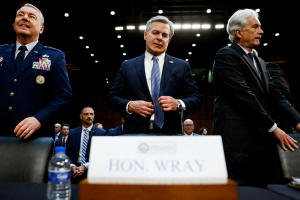Surveillance bill stumbles again in US House on privacy concerns
 Send a link to a friend
Send a link to a friend
 [April 11, 2024]
By Raphael Satter, Moira Warburton and David Morgan [April 11, 2024]
By Raphael Satter, Moira Warburton and David Morgan
WASHINGTON (Reuters) -A modest overhaul of a controversial U.S.
surveillance program foundered in the House of Representatives on
Wednesday after Democratic and Republican critics, including Donald
Trump, said it gave the government too much power to spy on its
citizens.
By a vote of 228-193, the Republican-controlled House prevented the bill
from coming up for debate on the floor. That leaves the program in limbo
shortly before it is due to expire on April 19.
House Speaker Mike Johnson, who backs the bill, told reporters he would
"reformulate another plan" without saying what that might entail. "It's
too important to national security, I think most of the members
understand that," he said.
At issue are elements of the Foreign Intelligence Surveillance Act, or
FISA, that allow law enforcement to scan vast mountains of data scooped
up by U.S. intelligence without first getting approval from a judge.
Hardline Republicans and left-leaning Democrats say that gives the
government too much power to spy on its citizens.
A U.S. court found last year that the FBI improperly searched the FISA
database 278,000 times over several years.

The law's backers have responded with surface-level reforms that would
leave the underlying bill largely unchanged.
The vote marks the third time that supporters have tried and failed to
reauthorize the program in the House, which Republicans control by a
narrow 218-213 majority. Some 19 Republicans and 209 Democrats voted
against taking it up this time.
Johnson could now try to extend the program temporarily before it
expires to give lawmakers more time to craft permanent changes.
The law, passed after the Sept. 11, 2001, attacks, allows the U.S.
government to spy on foreigners without getting court approval. The
government is not allowed to target U.S. citizens, but their
communications may be inadvertently collected during the process.
Critics say that effectively allows the government to arrest people
using evidence that was gathered without court approval, violating the
U.S. Constitution's protections against unreasonable searches.

[to top of second column]
|

FBI Director Christopher Wray, CIA Director William Burns and
Defense Intelligence Agency (DIA) Director Air Force Lt. Gen.
Jeffrey Kruse arrive to testify at a Senate Intelligence Committee
hearing on worldwide threats to American security, on Capitol Hill
in Washington, U.S., March 11, 2024. REUTERS/Julia Nikhinson/File
Photo

Trump, who is running to win back the White House from Democratic
President Joe Biden in the Nov. 5 election, said the law was
illegally used to spy on his campaign, without providing evidence.
"IT WAS ILLEGALLY USED AGAINST ME, AND MANY OTHERS," he wrote on
social media.
Trump has enormous influence among his party's lawmakers. His
opposition scuttled a bipartisan immigration deal earlier this year.
Officials with the FBI and the Department of Justice say the program
has been crucial in drug smuggling cases, foreign cybersecurity
threats and cross-border crimes.
After the vote, opponents on the left and the right said they would
try to require domestic-security agencies to get court approval
before searching Americans' communications.
FBI Director Christopher Wray said on Tuesday that officials would
be "blinding ourselves" if they had to go to a judge before using
the data. "I can assure you that none of our adversaries are holding
back or tying their own hands," he told the American Bar
Association.
At a news conference before the vote, Johnson said the revised
version included new protections for Americans.
"These reforms would actually kill the abuses that allowed President
Trump's campaign to be spied on," he said.
Trump has feuded with U.S. intelligence agencies since the FBI
investigated his 2016 presidential campaign for possible links to
Russian intelligence. The Department of Justice concluded in 2019
that Trump's campaign did not coordinate with Russia, but also found
that he ordered officials to obstruct the investigation.
(Reporting by Raphael Satter, Moira Warburton, Katharine Jackson,
Makini Brice, and David Morgan, writing by Andy Sullivan; Editing by
Scott Malone and Jonathan Oatis)
[© 2024 Thomson Reuters. All rights reserved.]This material
may not be published, broadcast, rewritten or redistributed.
Thompson Reuters is solely responsible for this content. |